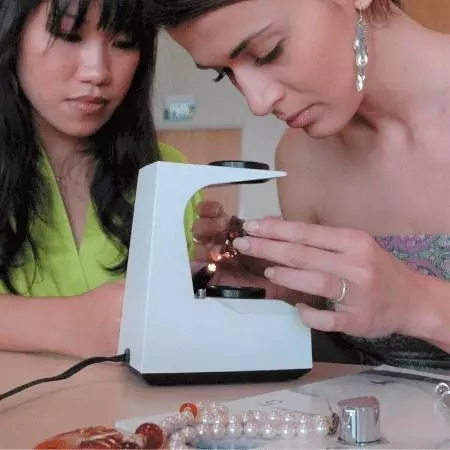Have you looked at your jewellery and wondered if the gemstones sparkling back at you are genuine? Most of us know, or have heard of at least a few DIY tests to tell if gemstones are real or fake . For example, have you tried breathing on a diamond to see if it fogs, hold a piece of jade to your skin to feel its coolness, or rub a pearl against the edge of your teeth?
The internet is rife with such tests that claim to help you identify real and fake gemstones, but the truth is:
- Most of them are not enough to help you deduce the identity of a gemstone (For example, the ‘tooth test’ for pearls is fairly accurate in distinguishing natural and cultured pearls from most imitations, but there are imitations out in the market that can pass the ‘tooth test’.
- Some DIY tests can cause irreparable damage to your gemstones, especially if you are scratching or applying heat to them.
Here are a few ways to get your gemstones properly evaluated so that you can receive accurate and reliable results without risk of damaging the valuable material.
1. Get your gemstones tested at a professional gemmological laboratory
This is the most reliable and accurate method of finding out what your gemstone actually is. Trained gemmologists will subject your gemstone to proper identification, grading, and valuation based on the properties of the stone, and can even deduce treatments that have been applied to the stone using proper gemmological equipment.
There are a few reputable gemmological laboratories in Singapore, including the Far East Gem Laboratory, Nan Yang Gemological Institute that offer services such as diamond verification and grading, coloured gemstone identification, jade identification, and jewellery appraisal. International gem laboratories are also easy to access with efficient and safe worldwide high value transportation services. Some of the most reputable international labs include AGS, Gubelin, GIA, IGI, HRD and all have offices in the Asia-pacific region.
2. Invest in a diamond tester or coloured gemstone tester
If you’re an avid buyer of gemstones or a dealer who needs to test many gemstones on a regular basis, electronic gem testers can be a convenient time-saver. These instruments are usually portable devices that function based on thermal conductivity and other properties of gemstones. They can distinguish natural diamonds from imitations, and separate common coloured gemstones.
In fact, Singapore is home to Presidium Instruments, a leading manufacturer of gemmological instruments that test and measure diamonds and other gemstones. In this following video, Tanja, the Dean of JDMIS, met with Armani Shariff, a member of Presidium, for an in-depth discussion of diamond simulants and synthetics, as well as diamond testing and screening.
3. Invest in gemmological training for yourself (and learn to test gemstones yourself)!
Whether you’re a gem enthusiast or a jeweller who works with gemstones, gemmological knowledge is a great asset. Sending your gemstones for certification from a professional gem laboratory remains the gold standard for higher value gemstones – but when collecting or buying and creating with less valuable gems, or even when comparing a gemstone to the provided certificate, you can develop the skills and knowledge needed to evaluate gemstones for yourself.
The Jewellery Design & Management International School (JDMIS) is the only specialized jewellery training institution in Singapore, and its gemmological training involves a two-step process that aims to provide a solid foundation in gemstones. The first course will give you exposure to the huge variety of gemstone materials available on the market, with more than 1800 exhibits for you to observe in class. The second course of JDMIS’ gemmological training teaches you how to use proper gemmological equipment such as the polariscope, refractometer, spectroscope, microscope and many more, to study the properties of gemstones and from there, deduce their identity.
Tanja M. Sadow G.J.G.
Dean and founder of the Jewellery Design and Management International School
